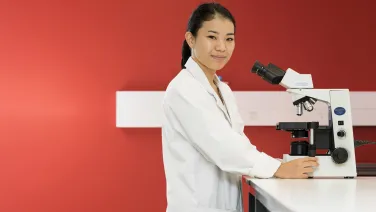How Chloe’s PhD partners with industry for plastic solutions

Moving across the world twice, thanks to pandemic travel limitations, Londoner Chloe Gomez is finally where she wants to be – back in the lab and driving real-world impact in plastic recycling.
Her research involves developing enzymes to break down PET plastics in collaboration with The Australian National University (ANU)-backed start-up Samsara Eco.
Through her Industry PhD at the ANU Research School of Chemistry (RSC) in the College of Science and Medicine, Chloe is supervised by Professor Colin Jackson, Research Founder at Samsara Eco.
Her project is supported through the Department of Education’s National Industry PhD Program’s Industry Linked PhD stream.
“I like that my research makes a difference. I feel strongly about recycling and the environment, which just makes me enjoy the work more.”
Real-world application and impact
Chloe had originally met Colin while visiting ANU in 2020 on an exchange when Covid hit, and he encouraged her to apply for a PhD “when all of this is over”.
She had to leave Australia, but while back in the UK Chloe finished her master’s in chemistry at the University of Nottingham and started working on plastic recycling and protein engineering.
When an offer came through to join the team at Samsara Eco, Chloe moved to Canberra to start her Industry PhD, although she’d never expected to go into industry.
“After completing my degree, I was more focused on following my interest in protein engineering,” Chloe says.
“I was lucky enough that Colin saw my research interest aligning with Samsara Eco, and so that step was easier than I’d have expected.”
Chloe says she feels fortunate to be in the right place at the right time. Samsara Eco’s work is being translated into large-scale industrial applications and collaborations, and in June 2024 the company raised $100 million in its latest funding round, which will help further scale its enzymatic recycling capabilities.
One of the things Chloe was drawn to about combining chemical biology and the Industry PhD, where a candidate is co-supervised by the University and an industry host, was making a real-world impact.
“I like that my research makes a difference. I feel strongly about recycling and the environment, which just makes me enjoy the work more,” she says.
Chloe works one day a week with Samsara Eco, and most of her PhD research at RSC is related to its projects. Through this experience, she says she’s learned a lot about the industrial applications of protein engineering.
“I can see myself going down the industry route. The Industry PhD is showing me different avenues that I wouldn’t have been exposed to if I was focusing only on academia,” she says.
Having settled now in Canberra, Chloe says she likes the slower pace compared to London.
“I love it here, obviously it’s a lot smaller than London, so it’s a bit weird, but I like that everything’s quieter,” she says.
“The seasons are nice and the weather's a lot better than in the UK – the winters are easier. I can see myself staying here for a while.”
Taking on a PhD embedded in Industry has been a huge eye-opener for Chloe.
“I’ve found that the expertise within the team at Samsara Eco inspires everyone to up their game, and the industry context is fascinating. I’ve learned so much just through listening,” she says.
“Joining a group of people that were so welcoming and accepting, and willing to explain when I didn't understand things, has been lovely.
"I've never been surrounded by so many smart people at one time!”
Chloe’s true passion is for lab work, so spending most of her time “doing the science” makes the Industry PhD a perfect fit.
“I’ve had people assume I’ll be working in a commercial role and move away from the science, but it’s a lot more blended. Everything I do is a mix between industry and academia, which I really enjoy,” she says.
“Seeing how industry and academia can work together has been beneficial to me in terms of helping me decide which one might be my path. You get the best of both worlds.”
Learn more about the ANU Industry PhD here.
Learn more about a PhD in Chemistry here.
Learn more about samsaraeco.com
This article was first published by ANU Research and Innovation.



